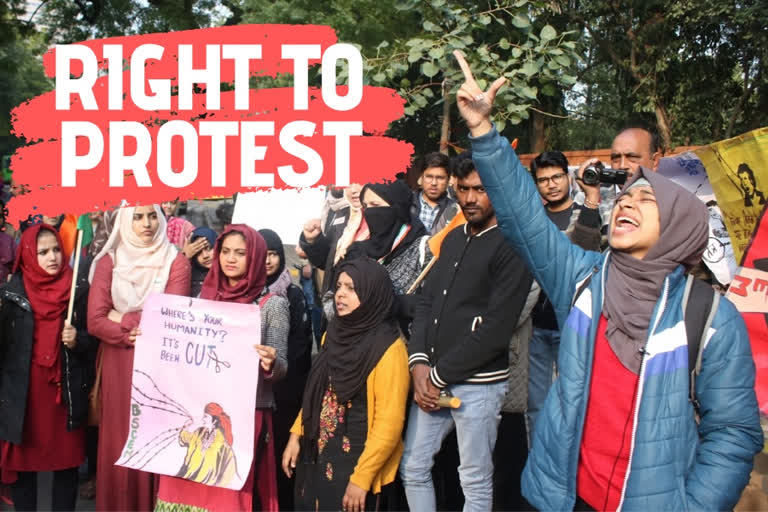New Delhi: In a democratic republic, citizens have a fundamental right to protest legally. The recent judgment by the three-member bench of the Supreme Court over the curbs in Kashmir, is surely a beacon amid the dark patch of actions of the government to autocratically suppress the fundamental right.
The court reminded the members of the legislative bodies and officials of the Constitutional provisions. The editor of 'Kashmir Times' and former Jammu and Kashmir chief minister Ghulam Nabi Azad, knocked the doors of the Supreme Court, appealing against the restrictions imposed and the suspension of telephone and internet facilities, in view of last year's repealing of special status to Jammu and Kashmir.
Subsequently, the CAA and talks of a nationwide NRC have escalated apprehensions in several cities and towns across the country. The government is trying to control such intensified agitations on the same lines as Kashmir. In the context Chief Justice of India NA Bobde responding rationally, the judgment given by Justices PV Ramana, BR Gavai, and R Subhash Reddy has touched upon all the three key issues and reminded the governments of their responsibility.
The Supreme Court bench made it clear that even though they had issued orders on October 16, the government has not revoked the prohibitory orders. In a democracy where transparency is the tenet of accountability, it is incumbent on the government to pass such orders. It reminded the government that the freedom of the Press is the most sacred right provided by the Constitution to check egoistic attitudes. It also made it clear that the attitude of dangling the sword over the heads of the press is not legal. It also made it clear that the prohibitory orders under CRPC and orders on the restrictions on the use of the internet are not legally tenable. These orders are literally sparks of a true democracy.
Read: Section 144 cannot be used to prevent exercise of democratic rights, says SC
It is not enough to boast of being the world’s largest democracy. But unfortunately, the spirit of democracy is fading among the ranks of leaders who do not permit legally tenable protests. The prohibitory orders which were framed in 1861 and brought in to avoid disruption to law and order in society, have also found a place in Indian Criminal Procedure Code, 1973.
In between the freedom of citizens to protest and the responsibility of the government to ensure that they do not go out of control and damage the welfare of the society, the balance has to be maintained. Failure of this has resulted in prohibitory orders and bloodshed through lathi-charges. The constitutional rights of the people are grossly violated.
The Supreme Court which reviewed the constitutional legality of Section 144 in 1970 itself, has prescribed when to use the section and on what grounds. The court has also detailed the application of 'reasonable restrictions' enunciated in Article 19 of the Constitution while imposing Section 144. It wondered whether the use of Section 144 was judiciously examined and due care is given to 'reasonable restrictions'. This was detailed in 2016-17, but there are no instances of government abiding by those guidelines.
In the context of Amendment to the Citizenship Act, it was a glaring example of totalitarianism to have brought the 22-crore population of Uttar Pradesh under Section 144 by a mere announcement on Twitter. Further, the High Court of Karnataka has also questioned whether the government could issue prohibitory orders on the pretext that every protest could become violent. The Supreme Court's judgement has little palliative effect for the dwellers of villages in the Amaravati region, where the prohibitory orders and the wielding of lathis by arrogant 'official' hooligans on the peaceful protests is all-pervading.
The three-member Constitutional Bench has given a judgment stating clearly that the prohibitory orders issued under Section 144, should not become instruments in the hands of the governments to suppress the legal spirit of freedom of expression. It is also evident that prohibitory orders should be issued when it is felt that there is a danger for law and order. Indiscriminate and whimsical orders are not tenable. All these orders are subject to review and they should be notified publicly, so as to help the victims to knock on the doors of the court. These orders of the Supreme Court are really laudable.
Statistics reveal that India ranks number 3 in imposing restrictions on the 'internet', next only to Iraq and Sudan, resulting in a loss of Rs 10,000 crore. The court ruled that obstruction or withholding of internet rights too comes under the Citizens' Fundamental Rights and has drawn lines to stop such practice. The court has asked the legislative body to rectify the lacuna of not defining the word 'temporarily' in 2017 rules. Until then, it asked the government to restore internet services.
Our 70-year-old existence as a Republic has not been able to inculcate the spirit of democracy either at the centre or to the state governments. The judiciary, which has been taking the initiative to protect the constitutional rights of the citizens is laudable and is the beacon of hope for the future.
Read: AP Capital row: Clashes break out as cops prevent women's march to shrine



